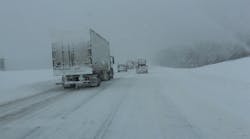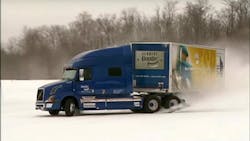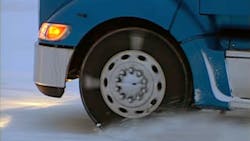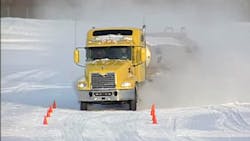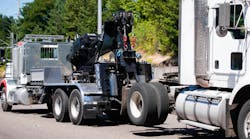Fleets are quite familiar with the challenges winter weather poses to truck operations, for not only do snow and ice make highways hazardous to navigate, the chemicals used to help remove them from the roadway can cause corrosion to take root on trucks and trailers as well.
Yet there are other peculiarities about winter conditions that can negatively impact various truck and trailer systems and components, too, noted Richard Nagel, director of marketing and customer solutions-charging group for Bendix Commercial Vehicle Systems.
“It’s really not the cold itself that brings the most potential for air system trouble – it’s the moisture that’s brought in with it when the compressor draws in air,” he explained to Fleet Owner. “If enough moisture makes its way through the air dryer, it creates the potential for condensation within the air tanks – and from there, it can travel downstream, affecting the braking system and other connected technologies.”
Yet the question is not only figuring out how to combat such cold temperature issues where air systems are concerned, but how to detect them in the first place.
Nagel said Bendix taps two maintenance resources to help identify and solve such problems. The first are fleet customers: during demonstration events, he’ll sit with fleet managers during Bendix demonstration events, tech talks, and field visits to get insight into the “best practices” they use to deal with a host of maintenance issues, including winter-related ones.
The second is through Bendix’s own test fleet of 30 trucks and 30 odd pieces of towable equipment.
When company engineers conduct various on-road tests, they collect a broad range of data, while the test fleet’s shop personnel encounter various maintenance issues they need to solve as well.
Nagel also runs the best practices gleaned from his interactions with fleets by Bendix’s test fleet technicians not only to verify their veracity but also to see if they can be simplified or improved upon.
“Because we have our own fleet of trucks, we get a lot of data – especially during our winter tests – that we can run through our lab engineering group as well,” he pointed out.
What sort of winter maintenance insight has all of that provided in regards to air systems?
Manually draining the air tanks, for example, proved to be a simple and fail-safe step to help keep the air system moisture-free in winter – draining the tanks at least every three months for a typical line haul truck up to as frequently as once a month for vehicles with what Nagel calls “high air demand.”
Sometimes, though, winter weather wins out – at least for a bit – and part of a vehicle’s air system will freeze. Typically, Nagel noted that fleets and drivers use alcohol or a similar de-icing solution to quickly clear the affected area. Yet Bendix engineers “emphatically advise against this” due in part to the company’s test fleet data.
That’s because term “alcohol” covers a wide variety of chemicals, and many of these can cause leaks or valve malfunctions by corroding the compounds used in brake system seals, or breaking down internal valve lubricants. Even methanol – a commonly used alcohol in de-icing solutions – can cause long-term damage.
“Of course, there are situations – such as a truck being down – that may call for drastic measures, including the use of a brake anti-freeze compound,” Nagel emphasized. “In those instances, it’s important to try to determine the precise location of the freeze-up and limit application of any ‘alcohol’ to that area, minimizing potential exposure to other parts of the air system.”
He added that it is important to identify the location where the “alcohol” was applied as it determines what downstream components might be affected.
“Later, when possible, check for leaks around the brake valves if the O-rings were exposed to the anti-freeze chemical,” Nagel said.
“[Air] leaks can be audible, or they can be detected by using soap spray,” he pointed out. “If necessary, replace the O-ring in a leaking valve with a new one, or replace the entire valve with a new or remanufactured component.”
Being able to refer back to specific engineering teams within Bendix helps ensure the right solutions to winter issues are established, Nagel noted.
“If a customer comes to us with an issue or we discover one during winter tests, we can get to work on it right away,” he said.
